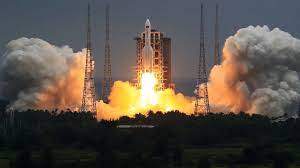China Advances Space Station Ambition With Module Launch

HONG KONG—China sent a core component of its new space station into orbit, marking a key milestone in the country’s ambitions to establish a permanent presence in space.
The 22-ton Tianhe module will eventually serve as the life-support and control center for taikonauts, as Chinese astronauts are called. It was launched Thursday morning from the Wenchang Spacecraft Launch Site on Hainan, an island off China’s southwestern coast.
China is planning a series of other launches into orbit this year, some of which will combine with Tianhe to form the Tiangong, or Heavenly Palace, space station. The country plans for the permanent space base to be operational by next year. It is seen as a rival to the much larger International Space Station, the multinational base involving space agencies including NASA.
“The successful launch of the Tianhe core module indicates that the construction of our country’s space station has entered the stage of full implementation and lays a solid foundation for subsequent missions,” Chinese President Xi Jinping was quoted as saying by state media agency Xinhua.
Mr. Xi said that the construction of the space station and the completion of a national space laboratory were important goals for China’s manned spaceflight project and an important step toward the nation becoming powerful in science, technology and aerospace.
China’s space program has made strides in the past few years. The China National Space Administration currently has a mission to Mars, known as Tianwen-1. It plans to land a rover on the red planet as early as May.
Tiangong will be China’s first self-developed space station, independently constructed and operated by China. Its successful launch is seen as a source of national pride. Premier Li Keqiang and other top leaders watched the launch live from a control center in Beijing, state media footage showed. Over the past decade, China has launched two experimental modules into space to prepare for a permanent station.
Since 2011, China has been excluded from working with NASA by U.S. law.
China’s push into space comes as the U.S. also passes new milestones. NASA’s Mars Ingenuity helicopter made history on Mars earlier this month when the drone became the first powered craft to fly on another world.
In the coming months, China plans additional launches to send cargo and crew to the Tianhe module, including the other two core modules that will form the bulk of the space station.
Photo and link: https://www.wsj.com/articles/china-advances-space-station-ambition-with-module-launch-11619699757




